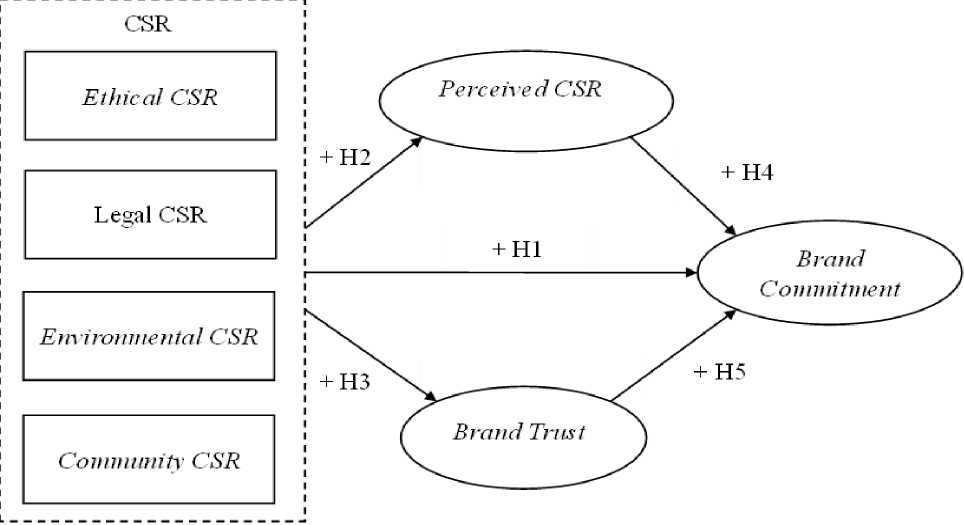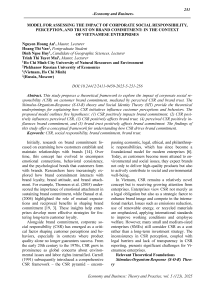Model for assessing the impact of corporate social responsibility, perception, and trust on brand commitment: in the context of Vietnamese enterprises
Автор: Nguyen Hoang An, Hoang Thi Van, Dinh Ngoc Huy, Trinh Thi Tuyet Mai
Журнал: Экономика и бизнес: теория и практика @economyandbusiness
Статья в выпуске: 5 (123), 2025 года.
Бесплатный доступ
This study proposes a theoretical framework to explore the impact of corporate social responsibility (CSR) on customer brand commitment, mediated by perceived CSR and brand trust. The Stimulus-Organism-Response (S-O-R) theory and Social Identity Theory (SIT) provide the theoretical underpinnings for explaining how CSR initiatives influence customer perceptions and behaviors. The proposed model outlines five hypotheses: (1) CSR positively impacts brand commitment, (2) CSR positively influences perceived CSR, (3) CSR positively affects brand trust, (4) perceived CSR positively influences brand commitment, and (5) brand trust positively affects brand commitment. The findings of this study offer a conceptual framework for understanding how CSR drives brand commitment.
CSR, social responsibility, brand commitment, brand trust
Короткий адрес: https://sciup.org/170209231
IDR: 170209231 | DOI: 10.24412/2411-0450-2025-5-251-256
Текст научной статьи Model for assessing the impact of corporate social responsibility, perception, and trust on brand commitment: in the context of Vietnamese enterprises
Initially, research on brand commitment focused on examining how customers establish and maintain relationships with brands [14]. Over time, this concept has evolved to encompass emotional connections, behavioral consistency, and the psychological bonds that customers form with brands. Researchers have increasingly explored how brand commitment interacts with brand loyalty, brand attitude, and brand attachment. For example, Thomson et al. (2005) underscored the importance of emotional attachment in sustaining brand commitment, while Bansal et al. (2004) highlighted the role of mutual expectations and reciprocal benefits in shaping brand commitment [19, 3]. These insights help enterprises develop more effective strategies for fostering long-term customer loyalty.
Alongside brand commitment, corporate social responsibility (CSR) has emerged as a critical factor shaping customer perceptions and behaviors, especially in contexts where product quality alone no longer guarantees success. From the early 20th century to the 1970s, CSR grew in prominence as global concerns about environmental issues and labor rights intensified. Carroll (1991) subsequently introduced a comprehensive CSR framework – the CSR pyramid – encom- passing economic, legal, ethical, and philanthropic responsibilities, which has since become a foundational model for modern enterprises [6]. Today, as customers become more attuned to environmental and social issues, they expect brands not only to deliver high-quality products but also to actively contribute to social and environmental well-being.
In Vietnam, CSR remains a relatively novel concept but is receiving growing attention from enterprises. Enterprises view CSR not merely as a legal obligation but also as a strategic factor to enhance brand image and compete in the international market. Issues such as emissions reduction, use of renewable energy, or recycled materials are emphasized, applying international standards to improve working conditions and employee welfare. However, many small and medium-sized enterprises (SMEs) still consider CSR as a cost rather than a long-term investment strategy. The inconsistency in CSR perception, coupled with legal barriers and lack of transparency in CSR reporting, presents significant challenges for Vietnamese enterprises.
Relevant Theoretical Foundations
Stimulus-Organism-Response (S-O-R) Theory
When customers have the opportunity to engage with and better understand the firm’s CSR activities, they will acquire greater knowledge of CSR, such as understanding the enterprise’s objectives and intended meaning. Customers will develop a deeper appreciation of the firm’s role, thereby fostering positive attitudes toward the brand [9]. CSR also promotes customer trust in the brand, and the customer community can more readily evaluate and trust the firm through sharing, support, or even direct participation in community activities organized by the firm. The final behavioral outcome of customers after experiencing the process of perception and emotion is attachment [1]. This attachment not only reflects an emotional commitment but also manifests as long-term loyalty, demonstrating a readiness to protect and advocate for the brand in personal and social networks [16]. Customers may also experience a sense of pride in aligning themselves with a socially responsible brand, thereby perceiving brand support not merely as a commercial transaction but as a contribution to the community [10].
Social Identity Theory (SIT)
The Social Identity Theory (SIT) is a core theory in social psychology and organizational behavior, focusing on explaining how individuals define themselves through the social groups to which they belong, and how this perception influences their attitudes, behaviors, and relationships with others. When firms implement CSR activities, they help customers perceive that they can take pride in affiliating with an “in-group” [2]. Customers may identify themselves with a brand that is responsible for protecting the environment or supporting vulnerable communities. Customers not only identify with the brand but also express a desire to directly participate in the brand’s CSR activities to strengthen their sense of group belonging. They feel that by participating, they are contributing to social value creation, thereby affirming themselves and reinforcing their commitment to the brand. Applying Social Identity Theory (SIT) partially explains the relationship between CSR, perception, brand trust, and brand commitment; when customers identify themselves with a brand based on CSR activities, they not only develop positive perceptions but also express long-term commitment.
Related Concepts
Corporate Social Responsibility (CSR)
Initially, CSR primarily addressed ethical concerns in business practices. Over time, it has evolved and been assessed across multiple dimensions and fields. In this study, CSR is conceptualized as a second-order construct, measured through four observed dimensions:
Ethical CSR refers to a company’s commitment to upholding ethical standards and principles in its activities, including practices such as honesty, fairness, and respect for stakeholders’ rights [7].
Environmental CSR represents the firm’s initiatives and actions aimed at minimizing its negative impact on the natural environment. These activities include energy conservation, recycling, sustainable resource utilization, and efforts to reduce environmental pollution [3].
Legal CSR emphasizes compliance with national laws, regulations, and rules in the jurisdictions where the firm operates. This includes adherence to legal requirements related to labor rights, occupational safety, and consumer protection [7].
Community CSR encompasses activities undertaken by the firm to contribute to the development and well-being of communities. This includes support for education, healthcare, and other community-focused initiatives [12]. Community CSR demonstrates a firm’s commitment not only to profitability but also to enhancing the quality of life for people in the regions in which it operates.
Perceived CSR
Brand Trust
Brand Commitment
Hypotheses and Research Model
The relationship between CSR and brand commitment
Sen and Bhattacharya demonstrated that CSR enhances positive brand perceptions, thereby strengthening customers’ commitment and support. Customers’ understanding and involvement in CSR activities play a crucial role in fostering brand commitment [18]. Customers with a strong understanding of a company's CSR tend to have stronger brand commitment due to positive perceptions of the company's ethics and responsibil- ity, which fosters emotional attachment and trust towards the brand, ultimately increasing commitment and loyalty. Therefore, the author proposes the following hypothesis:
H1: Corporate Social Responsibility has a positive impact on customer brand commitment.
The relationship between CSR and customers’ perceived CSR
Campaigns using recycled materials, ecofriendly products, and improvements in employee welfare and social well-being, when communicated alongside advertising, provide initial stimuli (O) that enhance customers’ recognition and awareness of CSR. Stimuli related to environmental and social issues contribute to shaping consumers’ perceptions, especially in the digital age when the company’s treatment of employees and its impact on nature can be easily shared and evaluated on social media. These CSR activities therefore significantly influence consumer perception. Based on this, the following hypothesis is proposed:
H2: Corporate Social Responsibility has a positive impact on customers’ perception of CSR.
The relationship between CSR and brand trust
Building a socially conscious image through community activities is one of the strongest signals to foster customer trust in a responsible brand. Consumers not only pay attention to CSR, but they also evaluate the company itself before making purchase decisions [5, 18]. Awareness of fraudulent or inauthentic CSR actions can either build or undermine brand trust. Brand trust and the use of the brand as a signal of social and environmental consciousness are explained through Social Identity Theory (SIT). CSR activities send a clear message to customers that they are part of a progressive group that cares about social and environmental issues, thereby increasing brand trust and expectations for future improvements. Therefore, the following hypothesis is proposed:
H3: Corporate Social Responsibility has a positive impact on customer brand trust.
The relationship between perceived CSR and brand commitment
Customer perceptions are easily influenced by various events and campaigns initiated by the company. On the positive side, CSR activities can emotionally engage customers, turning them into active participants in the company’s CSR efforts. Consumers tend to become more attached to companies that help or benefit them and others through CSR activities, and their commitment to such companies is proven to increase [8]. However, if customers perceive negative CSR signals, they are more likely to turn away from the brand. Sen and Bhattacharya (2001) explored how customers’ CSR perceptions can drive emotional attachment and loyalty [18]. Positive CSR perceptions, driven by the company’s authentic social actions, foster stronger emotional connections and brand commitment. Thus, the following hypothesis is proposed:
H4: Customers’ perception of CSR has a positive impact on their brand commitment.
The relationship between brand trust and brand commitment
Trust (O) has a significant influence on customers’ decision-making and behavior. Trust in a brand creates and reinforces customers’ commitment to it [4]. Brand trust reflects customers’ expectations about the brand’s reliability and integrity. When customers trust a brand, they feel safe and are more willing to develop long-term relationships. Pereira et al. pointed out that trust not only directly affects commitment but also indirectly strengthens loyalty by minimizing perceived risks [16]. Social Identity Theory suggests that recognizing oneself as part of a socially conscious customer group enhances emotional connection and reinforces the customer’s sense of respect and participation in positive social change, acting as a catalyst for long-lasting relationships. Therefore, the following hypothesis is proposed:
H5: Customers’ brand trust has a positive impact on their brand commitment.

Figure. The proposed research model
Conclusion
This study proposes a conceptual framework illustrating the relationships among key influencing factors. Grounded in the Stimulus-Organism-Response (S-O-R) and Social Identity Theory (SIT), the findings suggest that CSR fosters a positive brand image, enhances customer trust and attachment, and ultimately promotes brand loyalty. These results provide a theoretical basis for further scholarly exploration and offer practical guidance for businesses in developing CSR strategies aimed at increasing brand equity and sustaining long-term customer relationships.
Future Research Directions
Future studies should consider expanding the scope across various industries, integrating quantitative methodologies, and collecting empirical data to validate the proposed relationships. Further research may also investigate potential mediators such as brand equity, customer experience, or the role of social media in moderating the link between CSR and brand commitment. Additionally, examining the differential effects of CSR across demographic segments and cultural contexts presents a valuable direction for extending the current findings.


